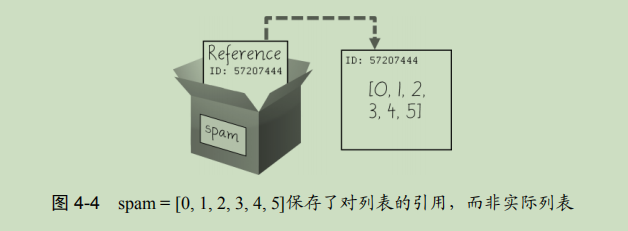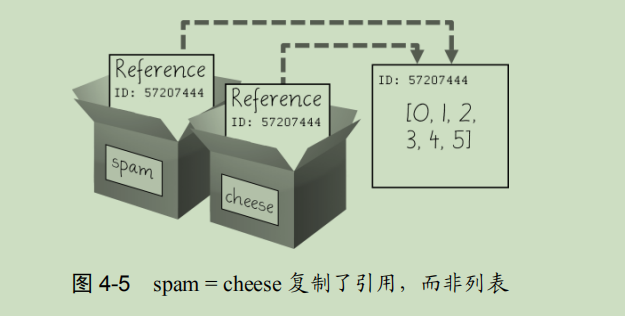1.可变和不可变数据类型。
- 列表是‘可变的’数据类型,它的值可以添加、删除或改变。
- 字符串是‘不可变的’,它不能被更改。
(1)字符串
- 尝试对字符串中的一个字符重新赋值,将导致TypeError错误。
1 a = 'abcd' 2 a[0]='e'
3 Traceback (most recent call last): 4 File "C:UserssummerAnaconda3libsite-packagesIPythoncoreinteractiveshell.py", line 2961, in run_code 5 exec(code_obj, self.user_global_ns, self.user_ns) 6 File "<ipython-input-37-93bf15c8bf3d>", line 1, in <module> 7 a[0]='e' 8 TypeError: 'str' object does not support item assignment
- ‘改变’一个字符串的正确方式,使用切片和连接
1 a = 'abcd' 2 a = a[:1]+'e'+a[1:] 3 a 4 'aebcd'
(2)列表
- 区别:列表的覆盖和修改
- 列表覆盖(并不能修改列表,而是创建一个新的列表)
1 b = [1,2,3] 2 id(b) 3 Out[42]: 95411912 4 b = [2,3,4] 5 id(b) 6 Out[44]: 95411720
- 列表修改(在当前列表修改,不会创建新的列表)
1 b = [1,2,3] 2 id(b) 3 Out[46]: 93984712 4 b.append(4) 5 b 6 Out[48]: [1, 2, 3, 4] 7 id(b) 8 Out[49]: 93984712 9 del b[0] 10 b 11 Out[51]: [2, 3, 4] 12 id(b) 13 Out[52]: 93984712
(3)元组
- 元组与列表的主要区别在于,元组像字符串一样,是不可变的。元组不能让它们的值被修改、添加或删除。
1 a = ('hello',1,'a') 2 a[0]=1 3 Traceback (most recent call last): 4 File "C:UserssummerAnaconda3libsite-packagesIPythoncoreinteractiveshell.py", line 2961, in run_code 5 exec(code_obj, self.user_global_ns, self.user_ns) 6 File "<ipython-input-54-f9da761c742a>", line 1, in <module> 7 a[0]=1 8 TypeError: 'tuple' object does not support item assignment
2. 引用
- 引用是一个值,指向某些数据。
- 在变量必须保存可变数据类型的值时,例如列表或字典,Python 就使用引用。
-
将列表赋给一个变量时,实际上是将列表的“引用”赋给了该变量。列表引用是指向一个列表的值。
-
对于不可变的数据类型的值,例如字符串、整型或元组,Python变量就保存值本身。
1 spam = [0, 1, 2, 3, 4, 5]
2 id(spam) 3 Out[66]: 95545224 4 cheese = spam 5 cheese 6 Out[68]: [0, 1, 2, 3, 4, 5]
7 id(cheese) 8 Out[69]: 95545224 9 cheese[1]='hello' 10 cheese 11 Out[71]: [0, 'hello', 2, 3, 4, 5] 12 spam 13 Out[72]: [0, 'hello', 2, 3, 4, 5]
14 id(cheese) 15 Out[73]: 95545224 16 id(spam)
17 Out[74]: 95545224



